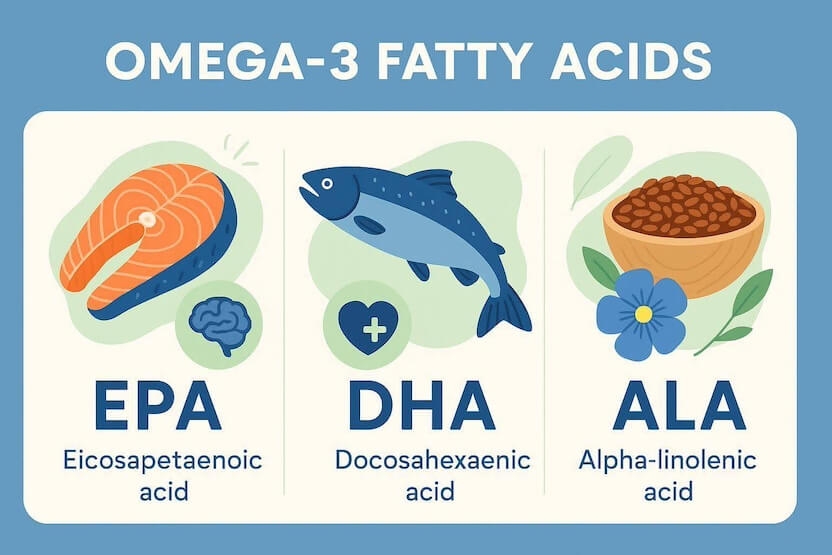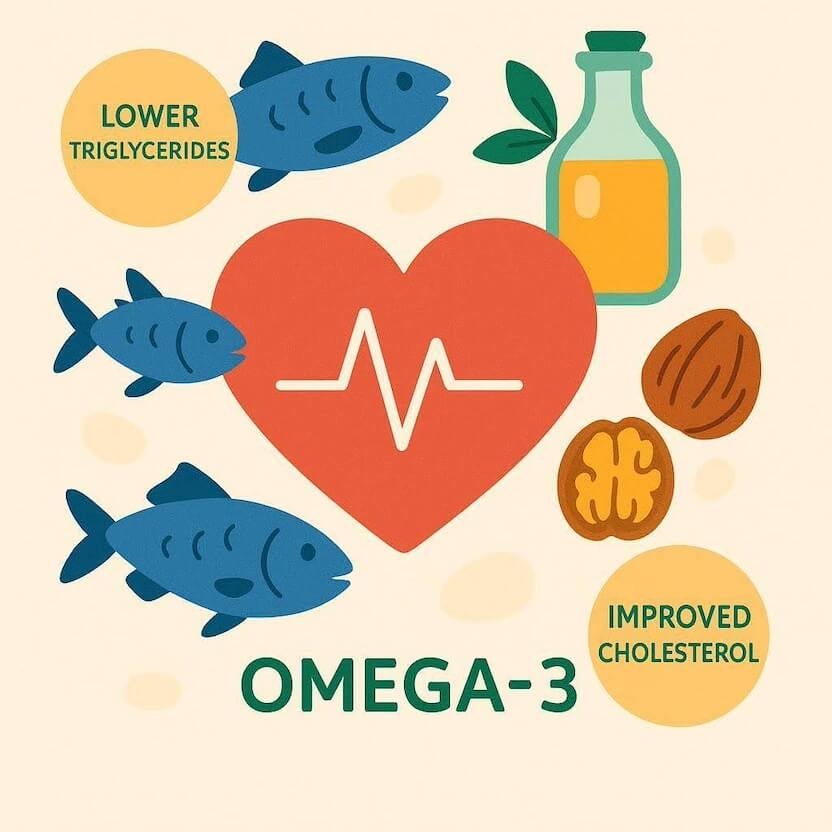Last update: July 30, 2025
4 minute read
Omega 3 Benefits for Men: How Do These Essential Fatty Acids Improve Heart, Brain, Joints and Sexual Health?
Omega 3 Benefits for Men: How Do These Essential Fatty Acids Improve Heart, Brain, Joints and Sexual Health?

By Derick Rodriguez, Associate Editor
Edited by Dr. Dimitar Marinov, MD, RDN, PhD

Omega-3 fatty acids might sound like another trendy health buzzword, but there’s solid science backing their importance. While your body recognizes omega-3s as essential nutrients, it can’t make them on its own.
Because of that limitation, we recommend finding reliable dietary sources or adding a purified supplement. From promoting a strong heart and sharper brain to easing joint stiffness, omega-3s offer benefits too impressive to overlook.
Fortunately, supplements like premium fish oil rich in omega-3s provide a safe, effective boost, free from mercury-related worries.
Key takeaways
- Omega-3 fatty acids like EPA and DHA are important for heart health, lowering triglycerides
- DHA supports brain function, including memory, focus, and possibly lowering cognitive decline
- EPA and DHA have anti-inflammatory properties that may help reduce joint pain and improve flexibility in some individuals
Understanding omega-3 fatty acids
Omega-3 fatty acids are a type of polyunsaturated fats. This type of fats includes essential fats, meaning your body absolutely needs but can’t create on its own. You must get these key nutrients through foods or supplements.
There are three major types:

- EPA & DHA: Mostly found in fatty fish like salmon and sardines; they actively help protect your heart and support your brain.
- ALA: Essential for the body. Sourced from plant-based foods such as flaxseeds, chia seeds, and walnuts, but it’s less potent because it must convert to EPA and DHA first, and the conversion rate is low.
The conversion rate matters: Research indicates that typically < 5 % of ALA is converted to EPA and < 0.5 % to DHA in adults. Therefore, even though ALA is essential, it's better to directly take EPA and DHA.
Omega-3s are crucial
Omega-3 fatty acids are highly concentrated in the brain, eyes, and even sperm cells, highlighting their role in basic health.

Get your personalized vitamin recommendations in less than 3 minutes.
Get your personalized vitamin recommendations in less than 3 minutes.

1. Heart health: Keeping your engine running smoothly
Research links regular omega-3 intake to lower triglycerides and steadier blood pressure. If you want your heart to love you back, omega-3s are a must-have.

Note: Omega-3s support, not replace, prescribed heart medications. Always check with your healthcare provider.
Condition | Omega-3 Benefit |
|---|---|
Hypertriglyceridemia | Greatly lowers blood triglyceride levels |
Heart Disease | Supports heart rhythm and blood-vessel health |
High Blood Pressure | Helps with modest reductions when taken regularly |
Atherosclerosis | May slow artery-clogging processes |
Purified fish-oil supplements almost eliminate mercury, giving men a clean, convenient option.
— Dr. Dimitar Marinov, MD, RDN, PhDEPA and DHA from marine sources play pivotal roles in maintaining cardiovascular resilience, helping to lower triglycerides and support healthy blood‑vessel function. Their anti‑inflammatory action can boost endothelial health, promote neurological health, and overall well-being.
2. Cognitive edge: Stay sharper, longer
Your brain depends on DHA. Some studies suggest omega-3 supplements can support memory, focus, and mood stability, and may be associated with a lower risk of age-related cognitive decline.
Think of DHA as a “building block” that keeps neurons communicating quickly and clearly.
Omega-3s help your brain!
Adequate omega-3 intake during pregnancy and early life is linked to higher cognitive scores in kids.
3. Joint health: Move (and feel) better every day
EPA and DHA deliver anti-inflammatory effects that may reduce joint discomfort, especially in arthritis. Some individuals also report reduced post-workout soreness, although controlled studies are limited.

4. Easy ways to get enough omega-3s
- Fatty fish (salmon, sardines, mackerel): Two servings per week can cover EPA and DHA needs.
- Plant sources (flaxseed, walnuts, chia): useful, but provide ALA only.
Source | EPA & DHA Level | Practical Value |
|---|---|---|
Fatty Fish | High | Best overall |
Seeds/Nuts | None (ALA only) | Helpful but less direct |
Men generally need 1.6 g ALA plus 250–500 mg EPA & DHA daily. Quality supplements, often third-party tested for purity, offer an easy safety net.
Omega-3 fatty acids remain some of the most-studied nutrients for long-term male wellness.
Frequently asked questions (FAQ)
Here are some of the most frequently asked questions about omega-3 benefits.
Final thoughts
Omega-3 fatty acids stand out as a nutritional star, supporting heart health, cognitive clarity and joint comfort, and even sexual wellness. Adding omega-3-rich foods or quality supplements is among the simplest and smartest steps we can take for overall well-being.
Are you regularly fueling your body with these important nutrients?
Sources and references
- Omega-3 Fatty Acids - StatPearls - NCBI Bookshelf
- The Relationship of Omega-3 Fatty Acids with Dementia and Cognitive Decline: Evidence from Prospective Cohort Studies of Supplementation, Dietary Intake, and Blood Markers
- Effect of omega-3 polyunsaturated fatty acids supplementation for patients with osteoarthritis: a meta-analysis - PubMed
Editor

Derick Rodriguez
Derick Rodriguez focuses on editing health and wellness-related content. With over half a decade of experience in the digital realm, Derick has developed a unique skill set that bridges the gap between complex health concepts and accessible, user-friendly communication. His approach is deeply rooted in leveraging personal experiences and insights to illuminate the nuances of health and wellness topics, making them more approachable and empowering readers with knowledge and confidence.
Fact checker

Dr. Dimitar Marinov
Dr. Marinov has years of experience in scientific research and preventive and clinical medicine. His publications in peer-reviewed journals are on nutritional status, physical activity, and musculoskeletal disorders among adolescents.
At VitaRx, we're not just passionate about our work — we take immense pride in it. Our dedicated team of writers diligently follows strict editorial standards, ensuring that every piece of content we publish is accurate, current, and highly valuable. We don't just strive for quality; we aim for excellence.
Related posts
While you're at it, here are some other relevant articles you might be interested in.

Get your personalized vitamin recommendations in less than
5 minutes.
Get your personalized vitamin recommendations in less than
5 minutes.




